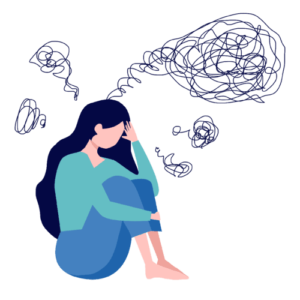
Internet Addiction Test
Answer these simple questions to understand more about your Internet Addiction. We share instant results and keep your information confidential.

What is Internet Addiction Test?
Internet Addiction Test is a process used to evaluate an individual’s level of dependence on the internet and its potential impact on their daily life. It involves standardized questionnaires, interviews, and observation to gauge the extent of internet use, withdrawal symptoms, and impairment in functioning. The assessment helps professionals diagnose and treat Internet Use Disorder (IUD) or Internet Gaming Disorder (IGD), ensuring appropriate interventions and support for those experiencing excessive and detrimental internet-related behaviors.
Who can benefit from this Internet Addiction Test?
Individuals of all ages who suspect they might have problematic internet use or internet addiction can benefit from this assessment. It is particularly helpful for those experiencing negative consequences in their personal, academic, or professional lives due to excessive internet use. Adolescents, young adults, and individuals with underlying mental health conditions may find the assessment valuable in identifying potential issues and receiving appropriate treatment. Early detection and intervention through the assessment can lead to healthier internet habits and improved overall well-being.


Internet Addiction Test Accuracy
The accuracy of Internet Addiction Test can vary depending on the tools used and the expertise of the assessors. Standardized questionnaires and diagnostic criteria contribute to its reliability. However, self-reporting biases and the evolving nature of internet use can affect accuracy. Tests by trained professionals yield more precise results compared to self-assessment. Overall, while the assessment can provide valuable insights into problematic internet use, it may not be flawless. Regular updates to assessment methodologies and considering multiple factors in conjunction can enhance its accuracy in identifying Internet Use Disorder or Internet Gaming Disorder.
Types of Internet Addiction Test
Young’s Internet Addiction Test (IAT):
A widely used self-report questionnaire to assess internet addiction based on the severity of online behaviors and negative consequences.
Internet Gaming Disorder Scale (IGDS):
A specific tool designed to assess problematic gaming behavior and the impact of excessive gaming on an individual’s life.
Compulsive Internet Use Scale (CIUS):
Measures the level of compulsion and loss of control over internet use, focusing on problematic online behaviors.
Problematic Internet Use Questionnaire (PIUQ):
Evaluates the extent of excessive internet use leading to adverse effects on daily life & psychological well-being.
Internet Addiction Test for Adolescents (IAT-A):
Adaptation of IAT for adolescents, assessing their internet use patterns and potential addiction symptoms.
Bergen Social Media Addiction Scale (BSMAS):
Specifically targets addiction to social media platforms, examining the frequency & consequences of social media use.
Handling Internet Addiction
Handling internet addiction is crucial for maintaining a healthy and balanced lifestyle in today’s digital age. Internet addiction can negatively impact mental health, relationships, productivity, and overall well-being. Here are some practical steps to help you or someone you know cope with internet addiction:
- Recognize the problem: The first step is to acknowledge that you or someone you know has an internet addiction. Be honest with yourself and assess the amount of time you spend online and how it affects your daily life.
- Set boundaries: Establish clear boundaries for internet usage. Allocate specific hours for online activities and stick to them. Avoid using the internet excessively during work or study hours and during important personal or family time.
- Create a schedule: Plan your daily activities, including both online and offline tasks. Having a structured routine can help reduce the temptation to spend too much time on the internet.
- Limit social media: Social media platforms can be a major source of addiction. Consider limiting your social media usage or taking periodic breaks from these platforms to reduce their influence on your life.
- Identify triggers: Understand what triggers your internet usage. Boredom, stress, anxiety, or loneliness can lead to excessive internet consumption. Find healthier ways to cope with these emotions, such as exercising, spending time with friends and family, or engaging in hobbies.
- Practice mindfulness: Be aware of your online behavior and its impact on your emotions and well-being. Mindfulness techniques can help you stay present and conscious of how you use the internet.
- Remove unnecessary apps and notifications: Disable notifications for non-essential apps and remove any apps or websites that contribute to your internet addiction.
- Seek support: Talk to friends, family members, or a mental health professional about your internet addiction. Sharing your struggle can provide you with valuable insights and support.
- Engage in offline activities: Find enjoyable activities outside the digital realm. Pursue hobbies, exercise, read books, or spend time with loved ones to balance your online and offline life.
- Use productivity tools: Employ apps and tools that can help you track and limit your internet usage. There are numerous apps designed to promote digital wellness and reduce screen time.
- Consider professional help: If internet addiction significantly impacts your life and you find it challenging to manage on your own, consider seeking professional help from a therapist or counselor specialized in addiction and digital wellness.
Remember, overcoming internet addiction is a process, and it’s okay to have setbacks. Be patient with yourself and keep making efforts to find a healthier balance between your online and offline life.